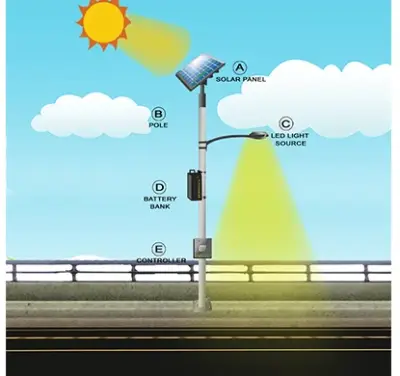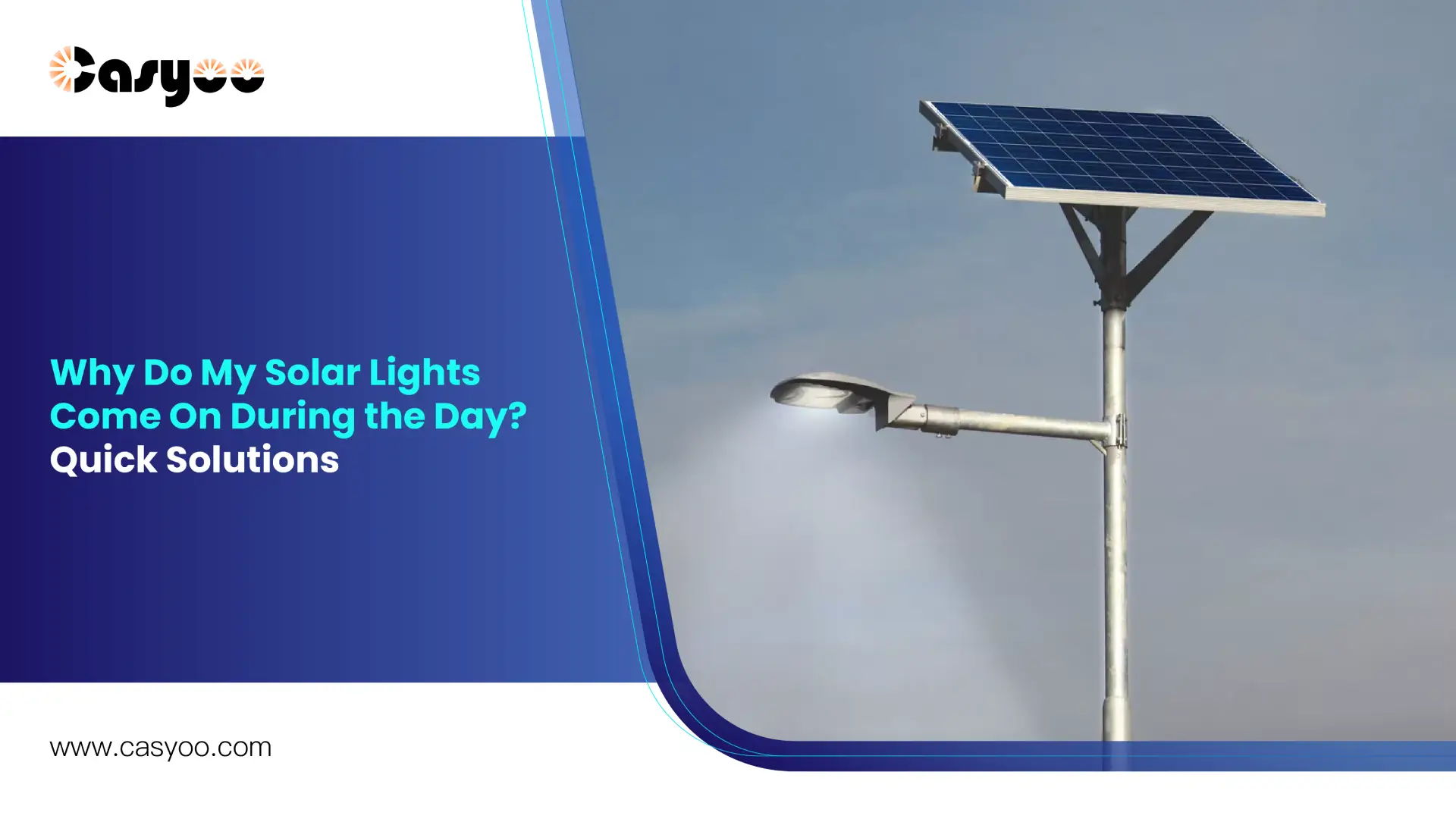Are your solar lights acting up and remaining on when they should be soaking up the sun? You are not alone. As an LED engineer working with solar lighting technology, I can tell you that this is one of the most common but misunderstood issues we face.
What is the good news? In most cases, you may resolve this issue without replacing your lights. Before we get into the answers, let me explain why this happens and how to get your solar lights back on track.
How Do Solar Lights Actually Work?
Consider solar lights to have a simple yet sophisticated brain. They are meant to be “awake” during the day, collecting energy while keeping their lights turned off. At night, they should “wake up” and use the stored energy to illuminate your environment.
The main components that operate together are:
- A solar panel (the energy collector)
- A photoresistor or light sensor (the decision maker)
- A rechargeable battery (the energy storage)
- LED lights (the output)
- A control circuit (the brain)
The photoresistor is the most interesting component; consider it as a tiny eye that detects darkness. When sunlight hits this sensor, it transmits a signal that turns off the light while the battery charges. The sensor detects lower light levels as dusk draws near and activates the light.

For what reason do they turn on during the day?
Throughout my years of field testing solar lights, I’ve identified five basic causes of daytime activation:
- Confused Sensors: Just as a filthy camera lens cannot produce clear images, a dirty or damaged light sensor cannot detect daylight. In our lab testing, even a tiny layer of dust can lower sensor sensitivity by up to 30%.
- Battery Issues: When batteries fail, they might create irregular behavior. We usually find this in lights that are 2-5 years old, although premium batteries can survive longer with careful care.
- Solar Panel Problems: A covered or filthy solar panel may not produce enough power for proper operation. This can fool the system into believing it is darkness.
- Water Damage:During durability testing, experts have discovered that water infiltration can result in short circuits that bypass the sensor’s regulation.
- Incorrect Sensitivity Settings: Some higher-end solar lights feature changeable sensitivity settings, which, if set incorrectly, can result in daytime activation.
Step-by-Step Troubleshooting Guide
When your solar lights keep going on during the day, a systematic approach might help you identify and rectify the problem quickly. Let me share the diagnostic technique I’ve created over the years of troubleshooting these difficulties.
Initial Diagnosis
First, gather some basic tools: a clean microfiber cloth, a mild soap solution, and a small screwdriver. Begin with a brief visual inspection, looking for visible dirt on the solar panel or sensor, water damage, or cracks.
Covering the entire solar panel with a dark cloth is the most straightforward test. After 30 seconds, take off the cover. You have identified a sensor issue if the light does not go out after a few seconds. This simple test avoids guesswork and guides us to the correct option.
Fixing Common Problems
Once you’ve discovered the precise problem, these are the proven solutions:
A gentle cleaning is frequently sufficient to resolve sensor difficulties. Use a gently moist microfiber towel to clean the sensor glass; avoid using harsh chemicals that could damage the sensitive coating. This easy repair has rescued several solar lights in my experience.
When dealing with battery troubles, especially in lights older than two years, replacing them with high-quality NiMH rechargeable batteries rated for solar applications will help to alleviate inconsistent daytime activation. Never use standard household batteries since they can damage the charging circuit.
If you discover water damage, the repair process will be more involved. Carefully unscrew the light, thoroughly dry all components, inspect for corrosion, and reseal with silicone waterproof sealant. This is more than simply getting the light to operate again; it is also about preventing future problems.
How to Prevent Solar Lights from Coming On During the Day
Strategic Light Sensor Placement
Light sensors can be readily confused by their environment. Reflective surfaces, such as nearby windows or water features, might produce strange light patterns, tricking the sensor into believing it is dark. Similarly, places with varying light levels, such as regions under trees with shifting shadows, can result in inconsistent activation patterns. Artificial light sources, such as security lights or street lamps, might also interfere with the sensor’s ability to reliably detect daylight.
Strategic placement is often the solution. After years of debugging these issues, I discovered that just relocating a solar lamp away from troublesome light sources or reflective surfaces can alleviate daytime activation problems. It can sometimes make all the difference to move the light a few feet. When selecting a site for your solar lights, consider not only the aesthetics but also the surrounding light environment, which may impair the sensor’s function.
Proper Switch Operation
Many solar light users ask me, “Should I turn off my solar lights during the day to prevent them from turning on?” Allow me to address this widespread worry.
While solar lights include autonomous sensors, the on/off switch is useful for troubleshooting daytime activation issues. Here’s how to apply it effectively:
When Lights Turn On During the Day:
- Perform a quick reset by turning the switch off for 30 seconds and back on.
- If the light remains off after a reset, your sensor is working properly.
- If the light turns on instantly, you most likely have a sensor or circuit issue.
Switch Operation Tips:
- Keep the switch turned on for normal functioning; the sensor will control the light.
- If your light keeps activating during the day, consider turning it off and keeping it in direct sunshine for 48 hours to fully charge.
- For consistent daytime activation, the switch can help you evaluate whether the problem is with the sensor or the battery.
Regular Maintenance Schedule
Regular maintenance is more than just cleaning; it is about extending your investment. Here’s the maintenance routine that I recommend to our commercial clients and have adapted for residential use:
Monthly Tasks:
- Wipe solar panels and sensors
- Check for water ingress
- Verify all mounting hardware is secure
Seasonal Tasks:
- Deep clean all components
- Adjust panel angles (if needed)
- Test battery performance
- Check seals and gaskets
Choosing the Right Solar Light
Not all solar lights are created equal, and understanding what to look for can help you save money and time.
Key Features of Quality Solar Lights:
- Efficient Solar Panels: Look for monocrystalline or high-grade polycrystalline panels
- Reliable Batteries: Premium NiMH or Li-ion batteries
- Durable Housing: At least IP65 water resistance rating
- Smart Controls: Adjustable sensitivity and timing options
While there are numerous solutions available, our solar street lights have all of these capabilities, as well as sophisticated motion sensing and increased battery life. Visit our website to learn more about these high-quality solar lights for professionals.
Frequently Asked Questions
Q: Does the charging of solar lights require direct sunlight?
A: While direct sunlight is preferable, decent solar lights may also charge using indirect light, albeit more slowly. In bright light, they work at approximately 40-60% efficiency, according to our tests.
Q: How long should solar lights last?
A: With careful care, premium solar lights should last for 3-5 years. The LEDs can endure for 50,000 hours or more, however the batteries need to be replaced every 2-3 years.
Conclusion
Most solar lights that turn on throughout the day can be fixed. Understanding how they function and following regular maintenance techniques will guarantee that your solar lights continue to perform as intended for many years.
Need professional assistance or want to enhance your solar lighting? Our engineering team is here to help. We provide free technical assistance for all of our products and can assist you in selecting the best solution for your specific requirements.




